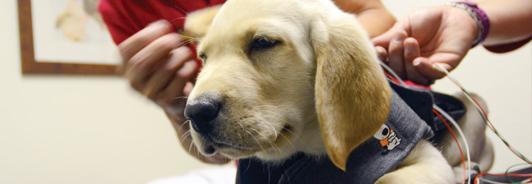去取回
这是全国第二家, 新的实验室将为小狗提供听力测试, 扩大学生培训
故事和摄影:Dan England
用那种只有新生儿才会用的语气, 猫猫, 或者在这种情况下, 小狗能激发灵感, Peter Scheifele leans into the furry face of a 7-week-old yellow lab and lavishes her with praise and pets.
This particular pup just had some wires inserted into her ear and put up with a test that would measure her brain activity in response to clicking sounds. Some puppies cry at or yip at the noise, and others squirm because, well, they’re puppies. But this little one was a champ, and that melted the serious scientist’s heart.
“哇,太棒了,”谢菲勒说. “你是个好女孩. 这么好的一只小狗.”
抛开依偎不谈,谢菲勒一心一意地工作. He’s at the UNC Audiology department to train faculty on how to use his Facility for Education and Testing of Canine Hearing & Laboratory for Animal Bioacoustics (FETCH LAB). 一旦安装好, UNC will be only the second university in the country to use the program he started at the University of Cincinnati.
该项目将给博天堂官方的教授, 最后,学生们, the ability to not only test animals’ hearing but to take it one step further by diagnosing the problem and possibly even treating it. It will give students another way to train to test infants’ hearing and to get certified in animal audiology. Having that skill could help them land a job in a zoo or expand their own practices to include breeders and their dogs.
Scheifele started the program in 2007 because of the profound problem of deafness in dogs. More than 80 breeds have hearing problems tied to genetics, he says. Dogs also develop problems when they are boarded in a kennel or forced to stay at shelters. 年龄也是原因之一.
“Anything they can get, we can get,” Scheifele says about the dogs’ causes for hearing loss.
He owes a lot to the groundbreaking work of George Strain, a professor of Neuroscience at Louisiana State University whose studies helped expose the genetic problems causing deafness in dogs. 他发明了测试狗的方法.
“他是这一切的始祖,谢菲勒说, assistant professor of Bioacoustics and Hearing/Speech at UC. “他让人们看到了问题所在.”
Of course, measuring a dog’s hearing is tricky. That’s the reason for measuring their brainwaves.
“It’s not like a hearing test you took in school as a kid,” Scheifele says. “它们不能抬起右爪.”
婴儿也不能举起右手, and that’s a big reason why UNC will bring FETCH LAB to its students.
“Testing for puppies is identical to testing for infants,凯蒂·布莱特说, professor of Audiology and the director of UNC’s FETCH LAB. “But we don’t have enough infants for our students to learn that process. 这似乎是一个很好的解决方案.”
In addition, breeders have to prove their dogs can hear before they place them in homes. Bright says the program will not only teach students how to do that for breeders but also allow them to get certified in animal audiology. Many veterinarians don’t want to test puppies because the equipment is expensive, Bright says.
The Audiology department hopes to offer the certification this fall and will also offer equine hearing tests.
“There’s a whole new field of animal audiology,” Bright says. “一些学生甚至专注于它. 所以这个项目将满足两个需求.”
Solutions are tougher for dogs with hearing impairments, Scheifele承认, 但是有一些工具, including a vibration collar and even sign language.
“We have put hearing aids in dogs as well,” he says. “We’ve even done cochlear implants, but those are so darn expensive.”
The idea is to diagnose the problems and next steps could include referrals to specialists. Three professors — including Bright, Tina Stoody and Jenny Weber — will oversee the program. 韦伯对此没有异议. 她有三个自己的实验室. In fact, you wonder if Weber got more out of the puppy time than the training.
“You’re such a good girl,” Weber said as she stuck her face close to one of the labs. NV






